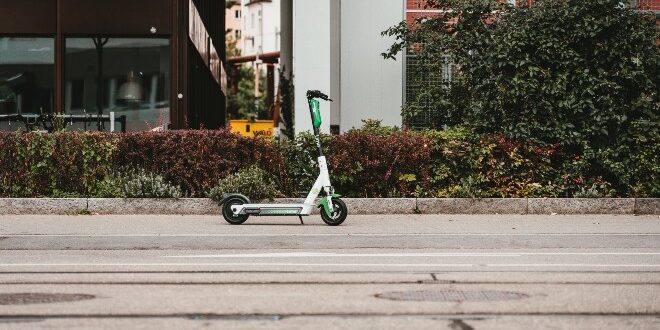TfL, London Councils and London’s boroughs are working together on plans for a trial of rental e-scooters in the capital.
This trial aims to promote safety standards and develop a better understanding of the impact of this emerging mode of transport on London’s roads. A competition has been launched today, which is open to all e-scooter operators. Up to three will be selected to take part in the 12-month trial, which is due to start in spring 2021.
Guidance issued by the Department for Transport in summer 2020 now allows local authorities in the UK to trial e-scooters as part of a rental scheme. The use of privately owned e-scooters on public roads is not covered by these changes and remains illegal in the UK. The Metropolitan Police will continue their work engaging with e-scooter riders, and where necessary, will enforce the legislation regarding the use of privately owned e-scooters.
The trials are part of a wider approach across TfL, London boroughs and national Government to enable people to use greener forms of transport and help avoid a damaging, car-led recovery from COVID-19, which would make air quality worse and increase congestion.
Michael Hurwitz, TfL’s director of transport innovation, said: ”We’re determined to make sure that London recovers from coronavirus as safely and sustainably as possible and are supportive of innovative solutions that could help.
“Safety will be our number one priority during this e-scooter rental trial, which will be critical to providing us the data and insights we need to determine whether e-scooters are a viable part of a greener and healthier future for London. We’ll continue to take the interests of all Londoners into account as we work towards starting the trial next year.”
Working together, TfL, London Councils and the boroughs will co-ordinate a trial in the capital, promoting safe and consistent standards across a defined, geographically limited trial area on London’s streets. All boroughs will be able to be involved in the trial, which will provide valuable data to understand the impact of these vehicles on the way people travel around the capital. Around one-third of London’s boroughs have expressed their intention to join the trial initially, with more considering joining at a later stage.
Mayor Philip Glanville, chair of London Councils’ Transport and Environment Committee, added: ”We are going ahead with this year-long trial to explore whether rented e-scooters could be a positive addition to London’s transport network, complementing walking, cycling and public transport and supporting our city-wide response to the coronavirus pandemic.
“Running the trial safely is vital and operator performance will be regularly reviewed. All companies applying to join the trial will need to demonstrate they have plans in place to keep our streets clear and protect riders, pedestrians and other road users – including more vulnerable Londoners. We will also be looking for operators that understand London’s unique and diverse local communities and infrastructure, and can work with London Councils, TfL and individual boroughs.”
Operators taking part in the selection process will be assessed on their ability to meet strict safety requirements and high operating standards. Operators will also be required to provide critical data for TfL and the boroughs to understand the impact of e-scooters on London’s transport goals, including Vision Zero, a shift to walking, cycling and public transport, zero-emission targets and other aspects of the Mayor’s Healthy Streets approach. This data will be shared with the DfT as it looks to bring in new legislation in this field.
Boroughs will control parking locations for e-scooters to protect against street clutter and will be able to designate certain areas as ‘no-go areas’ – where e-scooters cannot be ridden and will automatically come to a safe stop – or as ‘go-slow areas’, where the speed of the e-scooter will be automatically limited to 8mph. Like all other vehicles, e-scooters will be banned from riding on pavements but will be able to use the same space as bicycles. TfL, London Councils and the boroughs will also continue to work closely with stakeholders, including TfL’s Independent Disability Advisory Group, to ensure that the trial meets the needs of everybody living in, working in and visiting the trial areas.
The total number of e-scooters involved in the trial has not yet been determined, but TfL and the boroughs expect to start cautiously with between 60 to 150 e-scooters per participating borough, with e-scooters able to move freely across the trial area. Operators who demonstrate strong performance and compliance will be able to increase the number of e-scooters in their fleet over the course of the trial, whilst those who do not may have to reduce their fleet size.
Richard Dilks, chief executive of CoMoUK, said: “It is hugely welcome that there is to be a major e-scooter trial in London. Early data from the existing trials elsewhere in England shows very strong levels of use, and it is vitally important that London is part of the UK’s learnings from these trials as we work towards a green recovery.
“Greater coordination between transport authorities and operators is key to London making the most of what shared transport can offer. Shared transport must be at the heart of the decarbonisation agenda in the capital and right across the entire UK.”
Tom McPhail, director of public affairs at Pure Electric, said: “It is great that we’ll see a trial of rental e-scooters on the streets of London in 2021 but it is too late. Tens of thousands of people are already using privately-owned e-scooters in London and elsewhere around the country.
“Mostly they are doing so responsibly and without posing a danger to themselves or anyone else. However, they risk a fine and points on their driver’s licence. The law needs to catch up with this reality, particularly in the context of COVID where people absolutely don’t want to use public transport.
“We think the Government issue guidance now to create an interim solution, while it fast-tracks legislation to catch up with the social, environmental and economic benefits of this new form of transport.”
More details on how e-scooter operators can apply can be found here.
 micromobilitybiz Delivering news updates to the micromobility industry, focusing on e-bikes, e-scooters and green transport
micromobilitybiz Delivering news updates to the micromobility industry, focusing on e-bikes, e-scooters and green transport




